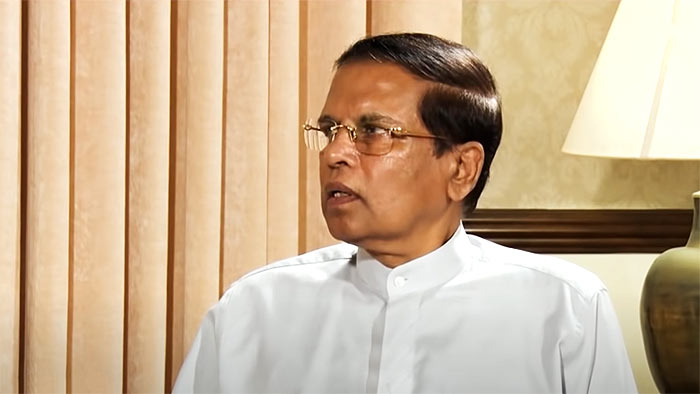Sirisena saw no threat to national security

(Photo: YouTube)
In 2015, the then President Maithripala Sirisena had not thought there would be a threat to national security and had agreed to hold the National Security Council (NSC) meetings once a month, instead of once a week as before, former Secretary to the President P. B. Abeykoon yesterday told the Presidential Commission of Inquiry (PCoI) investigating the Easter Sunday attacks.
Sirisena, Prime Minister Ranil Wickremesinghe and other stakeholders had agreed to hold the NSC, which used to meet once a week before, only once a month between 2015 and 2017, Abeykoon said.
The witness served as the President’s Secretary from 9 January, 2015 to 30 June, 2017. He had resigned from the post due to personal reasons.
Additional Solicitor General (ASG) Sarath Jayamanne, who led the evidence, questioned the witness on the NSC’s proceedings during his tenure.
Abeykoon said that initially the NSC had met once a week with the participation of the President, the Prime Minister, the State Minister of Defence, the President’s Secretary, the Secretary to the Ministry of Defence, officers of the Tri- Forces and the Inspector General of Police.
Wickremesinghe attended almost all the NSC meetings during that time, Abeykoon said. He said that the date was set by the President for those meetings and there were occasions when the meetings were not held, the witness said.
Abeykoon also said he believed that NSC meetings should be held once a week, but Sirisena hadn’t agreed. The witness added that programmes such as the National Unity and Reconciliation Programme, which had become major concerns of the previous government, might also have contributed to that attitude.
Asked by the commissioners whether there were any conflicts between Sirisena and Wickremesinghe at the time, Abeykoon said that there was no serious conflicts between them at that time. Although there were some disagreements over issues such as appointments, they did not seem to influence decisions pertaining to the national security, he said.
“During my tenure, issues such as religious extremism, madrassa schools and adverse effects of the burqa were discussed at the NSC,” Abeykoon said.
However, national unity and reconciliation programmes had prevented any decision on such matters. Discussions focused primarily on not creating differences between religions and ethnic groups, he said. “As government officials, we felt that no proper decision had been made on certain occasions.”
Chairman of the Commission asked the witness about the attitude Sirisena and Wickremesinghe had towards national security at that time. Abeykoon said that they had acted collectively on matters in that regard and the security forces made any requests, they did not object.
Abeykoon said the Defence Secretary, the head of State Intelligence Service, the Chief of National Intelligence and the officers of the three Armed Forces had been given the necessary facilities to meet and discuss certain matters with the President.
(Source: The Island – By Rathindra Kuruwita)
Latest Headlines in Sri Lanka
- Équité launches media guidelines to protect LGBTIQ+ rights in Sri Lanka January 28, 2026
- Saman Ekanayake remanded over state fund misuse January 28, 2026
- IMF commends Sri Lanka’s swift cyclone response, confirms EFF support January 28, 2026
- First Sri Lankan Navy SEAL graduate dies suddenly at 28 January 28, 2026
- Sri Lanka extends support to businesses impacted by Cyclone Ditwah January 28, 2026



Voting this guy into office was a great National Disaster.
Shocking to see still being active despite his total incompetence.
I think he is crazy and will loose many votes for Mahinder Rajapakse